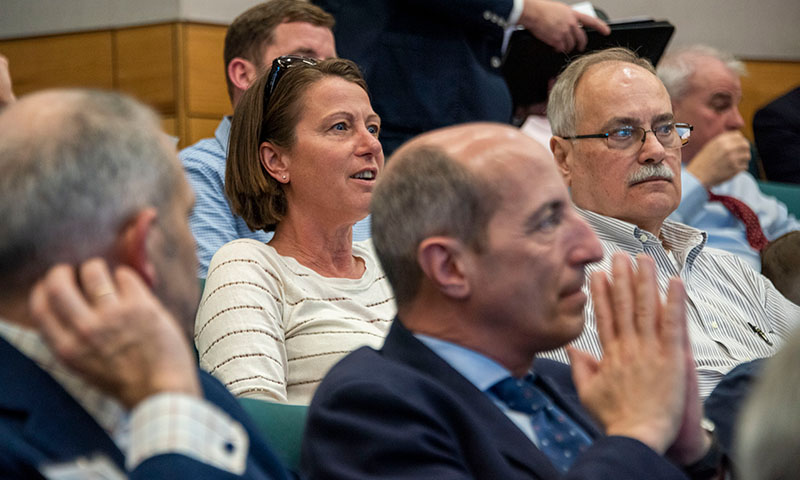Naval Postgraduate School (NPS) students and faculty had an unparalleled opportunity to explore emerging issues with U.S. and international leaders in the sphere of maritime air and missile defense.
In collaboration with the Maritime Theater Missile Defense Forum (MTMD-F), NPS hosted the Integrated Air and Missile Defense (IAMD) Colloquium, March 4, to engage U.S. and international leaders in the field through an array of insightful presentations and rigorous panel discussions.
The MTMD-F held the IAMD Colloquium as a capstone event of its three-week conference at NPS which brought experts from around the world together to keep abreast of a rapidly evolving domain. The forum has convened in Paris, London, Bergen, Rome, and now Monterey, Calif.
“The MTMD-F selected NPS for its yearly conference because of our recent addition of a new integrated air and missile defense program on campus; the synergy between our budding program and these experts created a great environment to tackle these problems,” noted retired Navy Capt. John Hammerer, NPS’ Chair of Integrated Air and Missile Defense.
“NPS is in a unique position where we possess not only the facilities and the accessibility to house an exchange like this one, but it also provides a chance for our staff and faculty an opportunity to exchange ideas with experts in topics from acquisition to engineering and operational development.”
Founded in 1999, MTMD-F is a partnership of 12 nations from around the world dedicated to fostering interoperability in all aspects of maritime air and missile defense, from technical aspects of systems integration and interface standards to strategic doctrine and tactics, techniques and procedures. The forum has become one of the U.S. Navy’s most effective international partnerships for research and development.
Included in the exchange were 12 separate working groups tackling a variety of topics related to air and missile defense, including modeling and simulation, battlespace management, operational requirements and test, planning and execution. The members of these groups ranged from engineers and architects to on-the-ground operators who could offer real world input on advanced topics.
“What makes this such a tremendous opportunity is that it allows for intense collaboration across different working groups about different aspects of problems from their own experience,” said Canadian Chester Conrad, co-chairman of the modeling and simulation working group. “Our group worked with prediction analysis by incorporating data from other working groups into synthetic environments for testing.
“Our ultimate goal is to move further along a roadmap to 2030 in integrating missile defense interoperability between 12 nations,” he continued, “and one of the benefits of hosting this event at NPS is that it helps speak directly with some of the future problem solvers and experts in this field.”
Cultivating these long-term relationships is a win-win for the MTMD-F and NPS students and faculty.
“Both NPS and the MDMT-F have similar goals in mind when it comes to advancing our missile defense capabilities and this was an incredible opportunity to be able to work hand-in-hand with the NPS students,” said Royal Australian Navy Graham Bick. “Over the three weeks I spent in Monterey, we were able to execute engineering processes in support of the forum as well as network with a number of great point of contacts for future endeavors.”
For Mike Metzker of Germany, who has been involved with MDMT-F for the past 10 years and was one of the co-chairs of the Open Architecture working group, this represents a continuation of interoperability between each nation and working group.
“When I joined the Forum each group mostly relied on themselves and had their own tasks to do, but nowadays people are asking the right questions and getting the right answers,” he said. “In our group, for example, we are working on creating interfacing standards between several software functions, and to do that we are relaying with the operational requirements group and the model simulation group to do the tests.”
“The biggest benefit is when I leave here, I can take all the knowledge and work that we gained here and implement it our management systems so that in the end be able to make our forces at sea more interoperable,” Metzger continued.


